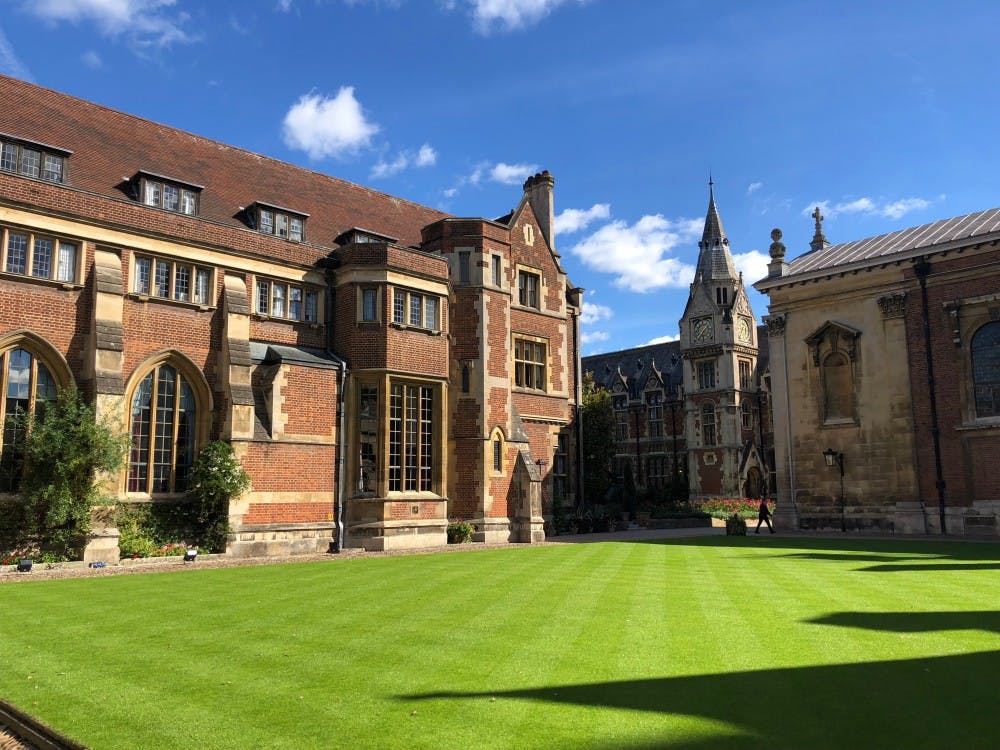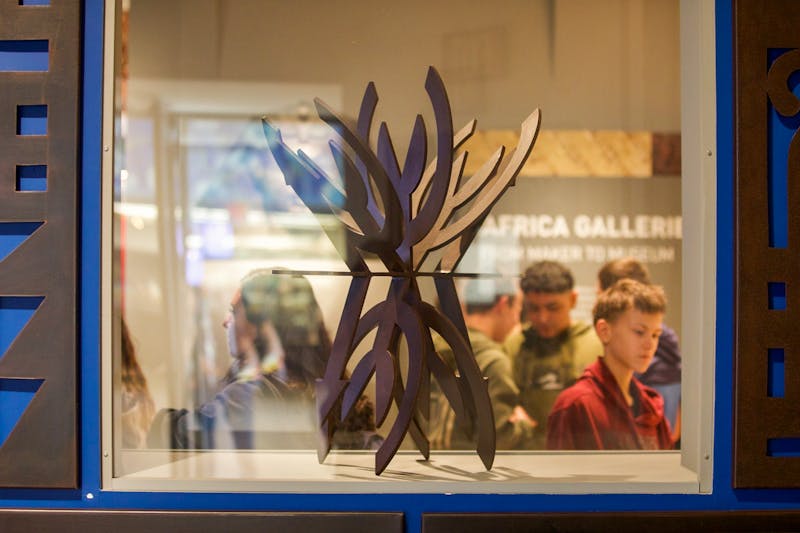
Cambridge University
After two years of learning at Penn — the oldest university in the United States — I began to wonder whether I should have instead applied to an entirely different set of selective universities: Oxbridge. To find out, I hopped off to the University of Cambridge for three short but enriching months on a study abroad program.
Cambridge, comfortably sprawled in a quaint English town an hour north of London, has enchanted visitors and students for 800 years, since its founding in 1209. Cobblestone paths rest beside perfectly mowed checkerboard lawns. Venetian-style boats glide along the river Cam as their passengers marvel at Gothic architecture of old libraries and chapels. Gowned students dine by candlelight in long Hogwarts-style halls.
But when I peeled back the layers of historical extravagance, I realized that while the Ivy League evokes less Harry Potter imagery than Cambridge or Oxford, the actual learning experience may be more worth the prestige than the English schools.
The first thing that sets Cambridge apart from Penn is its focus on depth of understanding rather than liberal-arts-style breadth. Instead of having majors within an interdisciplinary curriculum, Cambridge uses the Tripos system in which students exclusively study one subject area. Usually, a strict schedule of courses allows knowledge to be robustly and sequentially built.
Jonathan Chan, a second-year English student at Cambridge who was also admitted to Penn in 2016, calls his program “very structured, very rigid, very in-depth.” He believes that “the objective of making it so prescriptive is that they really want to train and cultivate generations of scholars.”
“I really appreciated it because [Cambridge’s English program] gives you a very comprehensive understanding of the development of English literature,” Chan said.
This rigorous and sequential structure means that academically, students graduate with a deep level of mastery in their subject. Additionally, for each class, each student has their own “supervisor” — a faculty member who guides study, often in a one-on-one setting.
However, the trade-off is breadth and general education. STEM students can go through their whole university careers without penning a single essay, or reading a book on politics or English.
Penn’s lack of sequence in some majors leaves students feeling spotty on certain foundational topics. But, mandatory classes in the College such as the writing seminar, language requirements, and Sectors of Knowledge allow students to gain a variety of skills and knowledge. Plus, the ability to choose classes and create individualized schedules promotes independence.
But the reason that going to Cambridge made me happy about spending four years at Penn extends far beyond the classroom. The organizational structure of clubs is so excessive that it is ingenious. While superfluous importance placed on extra-curriculars can be toxic, Penn’s obsession with executive boards gives students training for the real world, an attitude that sets it apart from Oxbridge.
At Cambridge, my British peers joined clubs for fun. I was taken aback that people were not fighting to the death for executive board positions. That English majors did not try to join all the consulting clubs (were there even consulting clubs?). That extra-curriculars were merely a side-gig to the larger world of academic enrichment.
My empty Google Calendar in October was a stark contrast to its mosaic madness in April, when I was at Penn. I realized that I found more value in Penn’s club culture than Cambridge’s academic intensity. Over the past two years, my growth had mostly come from my club involvements and pursuits in leadership.

I sat down with Wharton senior Neeraj Chandrasekar, former president of the Assembly of International Students, to reflect on how clubs have shaped him over the past four years.
“Clubs at Penn deal with a lot more high-stakes, real things. It’s more about ‘let’s go out and apply our knowledge, or pursue our interests in the real world, and see what comes of it.’”
He talked proudly of AIS’ initiative last fall in which international students had the opportunity to go to professors’ homes for Thanksgiving dinner, an idea born two years ago but unsuccessful until last year.
“It’s not really something you can prepare for in a classroom setting, I think you just have to go do it and learn from all the failures that happen.”
The second-semester senior, who has also been involved with 180 Degrees Consulting and Penn Microfinance, revealed that most of what he has learned and taken away from Penn, including working with diverse perspectives and forming relationships, has come from his club involvements.
And Chandrasekar’s experience is not atypical. “Everyone I feel is doing something outside of the classroom; everyone would agree that that’s been massively beneficial. I think that’s one of the things that makes Penn a special place.”
Most clubs at Cambridge avoid bureaucracy as much as possible and are mainly for enjoyment, a refuge from the academic intensity. Most at Penn are meant to develop experience and skills that are directly transferable to any career path, arguably more important than the academic experience.
At Cambridge, I spent three months with my nose in a book, surrounded by mahogany stacks and Victorian-style stained glass windows, hearing the old clock tower go “bong” every hour. It was a heavenly respite from Penn’s self-important club bureaucracies. But, if one looks for an experience that sets one up to succeed beyond a library, a college this side of the pond may be one’s best bet.

LUCY HU is a College junior from Auckland, New Zealand, studying Political Science. Her email address is lucyhu@sas.upenn.edu.
The Daily Pennsylvanian is an independent, student-run newspaper. Please consider making a donation to support the coverage that shapes the University. Your generosity ensures a future of strong journalism at Penn.
Donate






